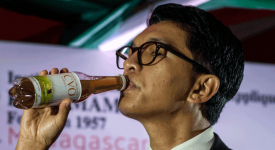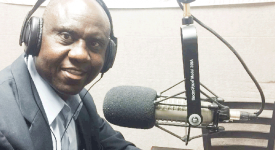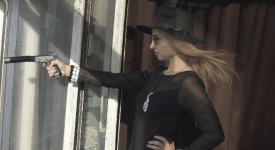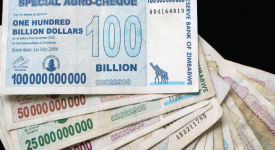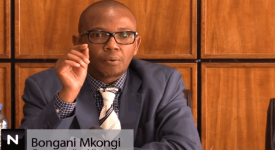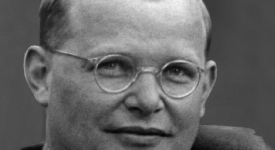Among westerners, Americans, in particular, there are individuals whose orientation about black Africa is of one big country, with several families, of weird-looking, very dark people. Also among Americans–and this is not speaking about America’s illiterates, uneducated, or misinformed–Nigeria is made up of several million of good-for-nothing, insipidly unintelligent scammers (courtesy U.S. Senator Ted Cruz). This is how they look at us–unfortunately for them. No jokes implied, (the highly regarded Cruz wasn’t joking either), his recent address to America’s Tea Party ought to be read along the lines of America’s racialized history. In short, Cruz may not “mean” what he said but his audience knew what he meant. This is how you get labelled along when fall under certain radar in power discourse.
With the addition of Boko Haram on the menu which international media serve on the screen directly to people’s homes, Nigeria is beginning to be renowned as Africa’s real-ly big country, with the largest human population–with a growing terrorism industry, which promises further escalation in years to come, which in many ways lends credence to the report about Nigeria breaking up in 2015, for which Nigerians generally credit the Central Intelligence Agency (CIA), although new denial statements by the U.S. representatives have started to emerge. Hopefully, the denying would not be intended for PR, diplomacy and face-saving, because in retrospect, history has not vindicated the U.S. empire’s role in the disintegration of countries, particularly those which are identified as threats to what is regarded as U.S. interests. Following this logic, therefore, the U.S. will not fold its hands or stand back and watch Nigeria pour sand in its sandwich, if the latter would not get out of the way for former. The U.S. is not known to be comparable to Nigeria where Nigerians have escape routes (meaning other countries to run to after destroying theirs!). U.S. would rather destroy you, the enemy, perceived or real. This is Nigerian spirituality is called FALL AND DIE, by fire or by force. We’ll get back to this at another time.
Many arguments have been put forward on the origins and objectives of the Boko Haram: some say it is the consequence of bad leadership in Nigeria; the result of poverty, lack of educational opportunities and social infrastructure in Nigeria’s northern region; political marginalization, among others. But according to the Boko Haram sect, it [Boko Haram] is the divine orchestral instituted by Allah to bring an end to all civil reign or human democratic institutions in the environment which Britain has heroically christened Nigeria. According to reports–including translated speeches of the ambassadors of the terror sect– they [Boko Haram’s lords] have just commenced a spiritual pogrom which will end with the overturn of all that is “un-Islamic”. In fact, by the time, this new administration is installed, me, myself and I will have been in hot chains of Boko Haram’s death-book, because by far I would be a top notch infidel. But, wait. And come to think of it, we can not continue to sit back, and summarily label these human murderers and society killers as idiots, while they continue to approach us with drums of terror droning bullets and machetes inside the head of unnumbered women and school children, launching missiles (not made-in-Africa) into buildings inhabited by civilians, slaughtering catholic priests, and other muslims, whom they consider infidels like myself, because they think these are unworthy of life through their one-way-interpretation of the prophet’s words and his writings (SWS). True, some of these readings of Boko Haram are correct: “Nigeria is corrupt”, which ought not to mean that we are the lamb to be sacrificed to regain and purify Nigeria. It ought not to mean a return to barbarity. Where then is The Better Angels of our Nature which Steven Pinker talks about? Aren’t these young men, under the name of Islam, giving a label of notoriety to the holy prophet? Or, are we to believe that they truly represent the message of the prophet of peace? If indeed they do represent him, we are tempted to say that the religion is far from being adequate, but if they do not, we are prone to modify and redirect our thinking towards other practitioners of the religion for answers to the menace to society which the group constitutes. To expect solutions which are devoid of the complex and complicated history of Nigeria would be, in fact, to unwittingly undermine the peace which we dream of. It would be like blaming Christian pastors for not coming out openly to condemn corruption. And that would be mostly unsophisticated effort.
Corroborating this, former U.S. ambassador to Nigeria, John Campbell, in his book Dancing on the Brink, poignantly emphasized the trendy culture of violence in which Nigeria and Nigerians swim. In some way, therefore, the elongated reins of Boko Haram does not come as a surprise to Nigeria’s princes. For your information, the current President of Nigeria, Dr. Jonathan, really, may not be factored among the princes who have rule over the Nigerian definition of kingdom. Note: if Jonathan has such a rule, the discontent that fuels the rise in terrorism targeting state operations would be quelled, perhaps, much more easily. At the most, there would have been other kinds of violence, but certainly not a reign of terror from Allah against Nigerianity, and by extension, against modernity, education, science, and progress, not in this magnitude. Boko Haram is the peak translation of fundamentalist violence stemming from a scriptural interpretation. In many ways, even among Muslims who would openly condemn corruption, Boko Haram has legitimacy and authorial sanctioning, particularly, in a clime where the gulf between the two dominant religions–Christianity and Islam–is not a mere facade, or phantasmagoria. For example, listen to preachers, Muslims and Christians alike, to see the epistemological claims which are implanted in the heads and minds of their followers.
In Nigeria, religion happens to one of the major avenue of gaining political relevance. In her excellently researched book, Political Spiritualities: The Pentecostal Revolution in Nigeria, Ruth Marchall illustrates that “this will to follow anew” in religion has political consequences in Nigeria. Having a religious followership is one way of commandeering attention of believers, getting things done for whoever happens to be (the boss) at the top; a system is established with divine injunction under the control of a founder/leader, which is a manifestly political order. In this new system, the founder/leader is not questionable. To rebel against his decision comes with consequences: social and community excommunication, and sometimes physical assault, because you have not obeyed the orders of the most high given through the mouth of the holy messengers. Unfortunately, obedient members in such community never sees anything wrong in the leadership. It is hard for them to see violence, until it comes to their turn. Even though there are pockets of female religious generals, who are also founders of sects; even though women constitute the majority of worshipers and religious believers in the country, the vast majority of the demography of spiritual leaders with national political relevance is patriarchy.
In a nutshell, to those who, in their wildest or mildest imaginations, never thought that minorities in Nigeria are entitled to power, the Jonathan administration, his rule, especially as someone from Nigeria’s south region, amounts to irreverent insult to their claim to power. Yet to the unwary fundamentalist scholar, the more they look the less they see. These are the classes of people who inherited the lion share of British thinking: if you still recollect, there was no south region in the early configuration of Nigeria; it was east, west, north. Later, midwest was added, but not south. Jonathan is from that south which had been ignored. His region is the stone which the builders of Nigeria had ignored, for now, it is the cornerstone. It is hard to believe that Nigerians do not see typologies of violence when they are not immediately affected. “So long as we get paid, we do not care about others who have been deprived of their due wages,” to quote a university don.
Similarly, one of the cheapest Trojan horses which struggling Nigerians have been permitted is endlessly engaged, engaged in self-satisfying arguments, which is really a way to participate in the politics of the land, more so, when our voices have been muted from the political process, ironically though by our our malformed consent. When sometime ago, thesis was argued–at the Faculty of Arts, University of Ibadan– to the end that Nigeria had no religious conflicts, the academics in the audience, most of whom were Christian church owners/leaders, became livid; some felt insulted. One of them gave a systematized and serialized catalog of every religious woe they had seen in Nigeria via the north, failing to pinpoint the participation of their own faith in the making of the countries dilemma. You would nearly think that it always takes two to fight, no, not in the imagination of the totalized.
Yet, Boko Haram ought to be seen within that epistemologically competitive space called Nigeria, and what has become permissible, or discourse of amoral-ness, because the socio-political, cultural and religious cultures environment so dictate. For the benefit of those who do not know that fear of Boko Haram begins the dramatization of palpable panic, be reminded that the current Nigerian national leader, Dr. Goodluck Ebele Jonathan, is not a magician, even though Nigerian style of governance is personality-cult, rather than institution-based. Such would be expected among the elite religious virtuosos whose shrines command the unflinching attention of several million marchers from far and wide. The man Jonathan is not just the first Southerner to become Nigeria’s president, but he is also an enigma, a true hard-nut to crack. There would not have been these rapid ruptures in the reterritorialization of Nigerian terror. Perhaps, these lines of argument are better temporarily abandoned for another space.
In conclusion, Boko Haram is the product of throwing stones in a glass house; Boko Haram is man-made, a homemade bomb, readily exploding, killing the maker and the enemy. It is Nigeria’s newly refined Frankenstein. Question is how many more lives would go before a dramatic checkmate is put on this Gothic, hell-producing, band of murders? To the sponsors of doom and death on innocent Nigerians, local and foreign, be informed that when the chips are down there would not be any place to hide because the violence produces violence. Like those Christian groups which embrace eschatological doctrines, Boko Haram sees itself as the lion of the Nigerian tribe in the north. Doctrinal differences among Nigeria’s religious leaders should be set aside to deal with this monster. These leaders must reconcile their differences or agree on one thing: Boko Haram is evil. This way, we may all avoid pushing 120 million people against the wall. We do not want to see these people take up sticks and head for the headquarters of violence.
In the follow up essay, we will move up the ladder to talk more about violence in Nigeria and Boko Haram’s role in it.
A CONTRIBUTION TO THE AFRICA FOOD SECURITY PROJECT (AFS)

